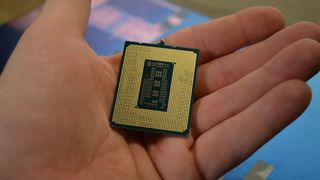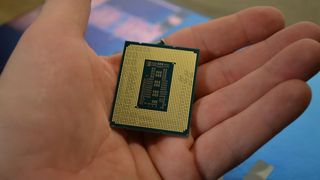Intel has been in hot water lately, with numerous reports of 13th- and 14th-gen i9 processors crashing while playing games and, in some cases, refusing to boot Windows altogether. Now Intel has released an official statement on the fiasco, but it’s probably not what users want to hear.
The blame game has been in full swing over the past few weeks, with PCGamer reporting that Epic Games publicly called out Intel over the issues. In a new statement provided to German tech news site Igor’s Lab, Intel has now placed the blame on motherboard makers for failing to properly implement “thermal and power delivery safeguards”. Intel says that it’s the motherboard’s fault that the chip is overheating – a bold stance for the chipmaker to take.
There have been some attempts to rectify the problems, with Asus releasing a motherboard BIOS patch, but the trouble is far from over. Gigabyte’s solution caused CPU performance to take a hit, angering some users who had already shelled out for a high-end new Core i9 CPU.
Is a fix incoming?
The affected chips span across two CPU generations, but both are built on the same chip microarchitecture: Intel’s 13th- and 14th-gen i9 processors use the Raptor Lake and Raptor Lake Refresh architectures respectively, hence why both have been affected. As far as we can tell, the issue is isolated to desktop chips – so don’t panic if you’ve just bought a shiny new gaming laptop with an i9-14900HX.
Intel admits in its statement that while it’s “continuing to actively investigate this issue” it hasn’t found the cause of the problem. The crashes appear to be related to power and thermal issues; basically, the chip draws too much power, overheats, and shuts off to prevent damage. Intel also provided a short list of other things that could cause system instability, which include using Windows Ultimate Performance mode and disabling processor C-states, as well as overclocking in general – all things that PC gamers might do to boost in-game performance, which is annoying.

As for what Intel is advising users to do, well… there’s not much to say. The statement seems to be directed more to motherboard makers than consumers, saying that “Intel strongly recommends customer’s default BIOS settings should ensure operation within Intel’s recommended settings”. In other words, not our problem.
Intel’s i9 chips are power-hungry beasts, with the i9-13900K reaching a staggering peak power draw of 337W in our review testing, and Intel even introduced a new ‘Extreme Power Delivery’ profile for its 13th-gen CPUs, so it’s perhaps unsurprising that the chips have been hit with thermal safety issues.
It’s a bit dispiriting to see Intel refuse to take accountability for this problem, especially since these i9 desktop chips are rather expensive. However, the CPU giant has said that it also intends to release another statement with more information in May, so that could change. And at least these problematic chips aren’t literally melting people’s components.
We have reached out to Intel for comment and will update this article if we receive a response.
You might also like…
Services Marketplace – Listings, Bookings & Reviews
